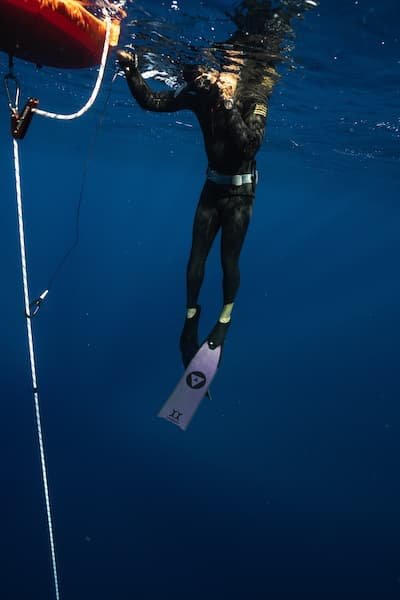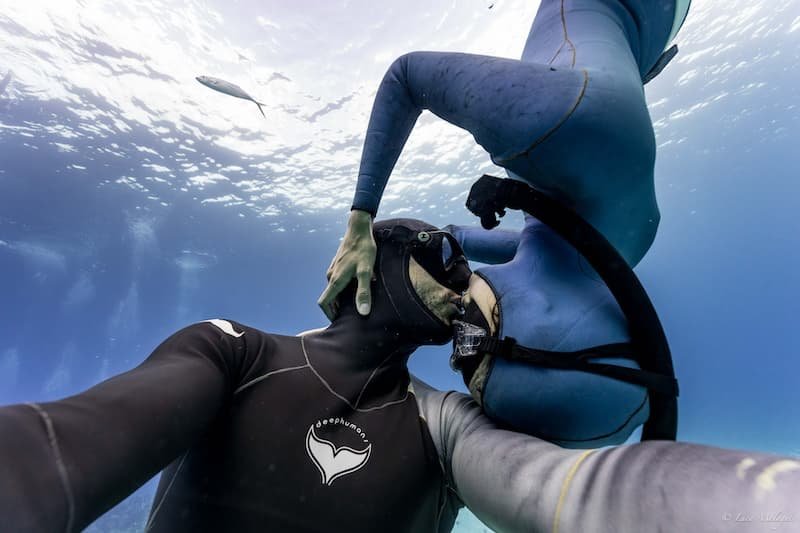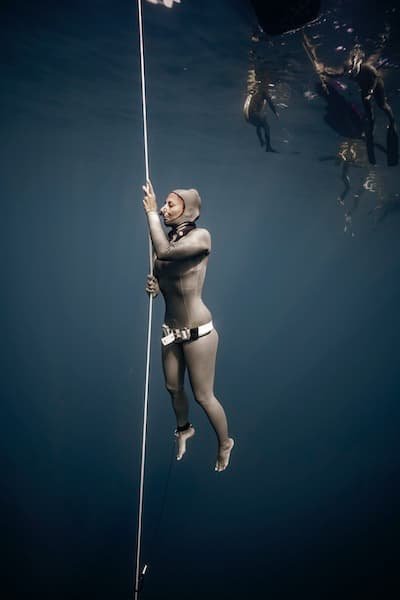
 Katie Wood
Freediver, Writer, Explorer
Katie Wood
Freediver, Writer, Explorer

 Katie Wood
Freediver, Writer, Explorer
Katie Wood
Freediver, Writer, Explorer
When you hold your breath and descend, there are no advertisements, no brand slogans, no clever marketing tricks. There is only water pressing against your chest and the fragile beauty of life around you. For freedivers, the experience is pure. Yet purity does not survive if the tools we carry into the water, the fins, wetsuits, masks, and snorkels, are made in ways that damage the very world we enter.
We live in a moment of crisis. Climate change is accelerating. Plastics choke marine life. Coral reefs collapse under heat. Fish stocks decline. This is no longer a problem for scientists or policymakers alone. It is now personal. Each time a freediver pushes into the blue, the state of the planet comes into focus. If we care for that world, then we must demand that the companies supplying our equipment care for it too.
The power of change lies with customers. It lies with you, with me, with every diver, surfer, runner, hiker, and swimmer who spends money and makes choices. When people demand more, when customers refuse to settle for half promises and shallow green marketing, companies must follow.
This is not only a dream. The data is already clear. Across the globe, consumers are shifting, asking for more responsible products, rewarding brands that act, punishing those that do not. Freedivers, because of our unique intimacy with the sea, must be at the forefront of this demand.
Surveys show that sustainability has become a global priority. A study by PwC in 2024 revealed that 85% of consumers say they already feel the effects of climate change in daily life. The same research found they are willing to pay almost 10 percent more for goods that are made sustainably. This is not a small margin. It represents billions of dollars of market power.
Another global report shows that 72% of consumers worldwide are ready to pay more for sustainable products. The number is even higher among younger generations. People under 35 often treat sustainability as a basic requirement, not a luxury. These shifts matter. Markets move when customers move.
Yet barriers remain. Consumers are often confused by unclear labels. Many products are marketed with vague promises of being green or eco friendly, words that sound good but mean little without evidence. Price is another factor. Even if people want to buy sustainable goods, higher costs can make that difficult. Availability also limits choices. In some regions sustainable alternatives simply do not exist.
The message here is simple. The demand is rising, but for it to truly reshape industries, customers must be relentless. They must not stop at words. They must insist on proof, on transparency, on honesty.

For freedivers, sustainability is not abstract. It is visible on every dive. We see plastic bags floating in currents, microplastic glinting in the sun, fishing nets abandoned on reefs. We notice coral turning white and fish populations thinning. We feel water warmer than it should be. For this reason, freedivers should be the sharpest voices demanding sustainable equipment.
Transparency should be the first demand. Companies must reveal where materials come from, how they are processed, what energy powers their factories, what waste streams are created, and where it all ends up. Without transparency there can be no trust.
Durability should be the next demand. Freediving gear is expensive. It should also be long lasting. A fin that breaks after two seasons is not only a financial burden. It is a waste of materials, energy, and shipping. Companies should design for repair, not disposal. Spare parts should be available. Blades should be replaceable. Wetsuits should be patchable. Customers must demand that longevity becomes the standard.
Manufacturing and logistics must also be addressed. Energy use, emissions, and transportation are all part of the product footprint. Brands that power factories with renewable energy, optimize shipping, and reduce waste must be supported. Those that do not should be pressed to change.
End of life responsibility is essential. What happens when a fin can no longer be used, when a wetsuit wears thin, when a mask strap finally tears? Too often the answer is landfill. This is unacceptable. Customers should demand take back programs, recycling schemes, or partnerships with organizations that repurpose gear.
Finally, customers must demand honesty. Greenwashing is common in every industry, including outdoor sports. Words like eco or sustainable are used freely without evidence. Customers must ask for certifications, third party audits, and measurable goals. Brands that hide behind vague marketing should be called out.
It is important to be honest about the challenges. Asking for sustainability is not simple.
Cost is real. Sustainable materials can cost more. For a freediver already investing in carbon fins or custom wetsuits, adding extra cost can feel impossible. The solution is not to accept cheaper, destructive products, but to demand that companies absorb some of the costs themselves, invest in efficiency, and scale solutions so they become affordable.
Information is often hidden. Many brands do not share enough data. Customers must dig, ask, and push. Communities can help. Freedivers share knowledge in forums, on boats, in classes. This collective voice can fill the information gap.
Performance concerns are also real. Freediving gear must be safe, efficient, and comfortable. If sustainability sacrifices performance, freedivers may hesitate. But innovation is proving these fears wrong. Brands are showing that recycled plastics, natural rubbers, and renewable energy production can still deliver world class gear. Customers must insist on both performance and sustainability, not one at the expense of the other.

Freedivers are closer to the ocean than almost any other community. Surfers ride the surface, divers descend with tanks, but freedivers place their bodies at the edge of human capacity with nothing but a breath. That intimacy with the sea comes with responsibility.
Freedivers already invest heavily in equipment. Unlike casual snorkelers, freedivers often buy high-end carbon fins, precision masks, and custom wetsuits. That investment means freedivers have leverage. They can demand better and pay for it.
Freedivers are a community built on sharing. We train together, travel together, post together. When one freediver champions a sustainable brand, others listen. When one freediver exposes a dishonest company, word spreads. This amplifies our collective voice.
Most of all, freedivers witness fragility. We see reefs bleach, fish vanish, temperatures rise. We feel ecosystems shift. This direct experience should make us stronger advocates. When freedivers demand sustainability, it is not only as consumers. It is as guardians of what we love.
History shows that when consumers push, companies respond. In the outdoor industry, customer pressure has already led to major changes.
Brands now use recycled polyester, organic cotton, and natural rubber where they once used only petroleum based materials. Companies publish annual sustainability reports. Many invest in repair programs. Some experiment with circular business models, where gear is refurbished and resold rather than discarded.

If freedivers take this seriously, the industry could transform. Imagine gear that is entirely recyclable, fins built with reclaimed ocean plastics that still deliver precision thrust, wetsuits with natural rubber that stretch and insulate without harming ecosystems, packaging that is minimal and compostable.
Imagine companies openly publishing carbon footprints, showing exactly how much energy was used, what emissions were created, and what actions are being taken to reduce them. Imagine take back programs where old fins are returned, broken down, and remade into new ones. Imagine freediving schools teaching not only equalization and safety, but also environmental responsibility, showing students how their gear is made and how to choose wisely.
These changes are not fantasy. They are possible if demand is strong enough. But companies will not move without pressure. That pressure must come from us.
There is no need to wait for perfection. Every freediver can start now. Ask questions of brands. Support the ones that are already trying. Refuse those that are not. Repair gear rather than replacing it quickly. Share information with other divers.
Use your voice. Email a brand and ask where their materials come from. Post on social media about sustainability in freediving. Choose gear that aligns with your values. When traveling, support dive shops and schools that care for the environment.
Every action matters. Every purchase is a vote. When enough votes are cast for sustainability, the market shifts.

Some say individual action is too small. That is not true. Individual action scales into community action. Communities create cultural pressure. Cultural pressure shapes industries.
Some say sustainable gear is too expensive. Costs are falling as demand grows. And the real cost of unsustainable gear is paid elsewhere, in damaged reefs, in polluted waters, in lost ecosystems.
Some say performance suffers. Innovation is already proving otherwise. Brands that invest in research are finding ways to meet both goals. Customers should not accept the false choice between sustainability and performance.
The freediving world could become a model for sustainability. A community deeply connected to the sea, demanding that every product reflect that connection. A market where gear lasts longer, pollutes less, and gives back more. An industry where transparency is a given, where greenwashing is exposed, where honesty prevails.
This is the vision. Freedivers must demand it. Customers must demand it. Change will not come from silence. It will come from insistence, from persistence, from the pressure of people who care.
The ocean gives us silence. Let us return the favor by demanding that our gear protects that silence, not destroys it.
References